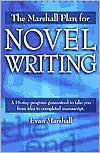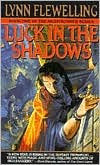 Another productive week behind me! I've stopped trying to edit as I go. The forward rush really takes all the time I have. It's better not to edit anyway, although a little tweaking for clarity as I write is fine. I almost finished the antagonist's scenes -- only two more to write. They were, as anticipated, much shorter and it was a welcome relief to see that I could still keep scenes brief and tightly-focused. Running long is not a good pattern to fall into.
Another productive week behind me! I've stopped trying to edit as I go. The forward rush really takes all the time I have. It's better not to edit anyway, although a little tweaking for clarity as I write is fine. I almost finished the antagonist's scenes -- only two more to write. They were, as anticipated, much shorter and it was a welcome relief to see that I could still keep scenes brief and tightly-focused. Running long is not a good pattern to fall into.My minimum goal is ten scenes per week. I was able to write more scenes this past week due to the fact that many of these scenes were shorter. As I transition into the main character's POV, the scenes will tend to run long again. The word count is currently in line with where it should be, but I'm sure it'll grow at least somewhat excessive again from this point forward, so I'll leave the estimated word count at 110,000, instead of 100k.
I have about 51 more scenes to write. That should take about five more weeks. If so, then I'll actually finish the draft in seven weeks instead of eight, which is terrific since it'll leave me with another week to use for the editing! I've set a date in January for this novel to be completed, in time to submit it for the next Amazon Breakthrough Novel Award contest.
Up to this point, I've been planning on a pattern of many short chapters. Each chapter has only one scene. Thus, eighty scenes equals eighty short chapters. Some run 500 to 600 words, others closer to 2000 words, so there is variety. The generic word count goal per chapter (scene) is 1250 words, with a range from 500 to 1750 or thereabouts. I may keep this arrangement or I may decide to group the scenes into fewer chapters of multiple scenes. I'll wait until the editing phase to make that decision. The rationale for many short chapters is the idea that people sometimes read in short installments and the goal is to make the story readily accessible for reading during the daily commute or the typical lunch break.
That's all for now! I'm enjoying it and trying to remember to pace myself. It is a marathon, and I have a lot left to write, so best not to overdo. I have to complete this draft, then I still have many weeks of intense editing ahead of me. I look forward to the time when I can share the completed story!
Best wishes for your own writing progress,
Adrian












